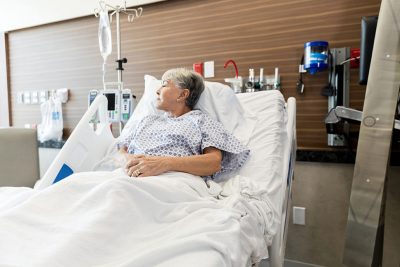
Patients Hospitalized for Nonsevere COVID-19: No Benefit of CAP Antibiotics
July 1, 2025
By Richard R. Watkins, MD, MS, FACP, FIDSA, FISAC
Synopsis: A large population-based, retrospective, cohort study found there was no benefit for antibiotics targeting community-acquired pneumonia in patients hospitalized with nonsevere COVID-19. These results provide evidence against antibiotic use in this population.
Source: Pulia MS, Griffin M, Schwei R, et al. Antibiotic treatment in patients hospitalized for nonsevere COVID-19. JAMA Netw Open. 2025;8:e2511499.
The overprescribing of antibiotics is the major driver for the ongoing spread of antimicrobial resistance. Previous studies have shown that inpatients with COVID-19 receive antibiotics more than 30% of the time, when in reality only 5% of cases are confirmed to have a bacterial coinfection. Pulia and colleagues sought to determine the association of community-acquired pneumonia (CAP) antibiotic treatment started on admission with clinical deterioration and in-hospital mortality among patients hospitalized in the United States for nonsevere COVID-19.
The study was a retrospective cohort analysis that included adult immunocompetent patients admitted for COVID-19 at 1,053 medical centers in the United States from April 2020 to December 2023. The investigators used the Premier Healthcare Database, which has deidentified data for approximately 25% of annual inpatient admissions in the United States. Patients were excluded from the study who presented with bacterial infections other than pneumonia for which antibiotics are appropriate (e.g., urinary tract infection, sepsis), those receiving immunomodulating drugs, those admitted to the intensive care unit (ICU), those with neutropenia, and those with an unknown sex.
The primary endpoint was a composite measure of clinical deterioration. This was defined as a transfer to a higher level of care than the general medical ward (e.g., ICU or intermediate care), initiation of high-flow oxygen, noninvasive ventilation, invasive mechanical ventilation, and in-hospital mortality occurring on hospital day 2 or later. Secondary outcomes were all-cause readmission to the same institution at 30 days and hospital length of stay (LOS). Antibiotic adverse events, including acute kidney failure, allergic reaction, or Clostridioides difficile infection, were evaluated as safety endpoints.
The cohort included 520,405 patients with a median age of 66 years, 51.2% were male, and 53.7% had Medicare insurance. There were 160,482 patients (30.8%) treated with a CAP antibiotic on hospital day 1. The median days of antibiotic therapy were three. The median LOS was four days. Overall, 95,055 patients (18.3%) deteriorated and 22,355 (4.3%) died during the hospitalization, while 39,266 (7.9%) were readmitted to the same hospital within 30 days. The only patient characteristic that was meaningful was Hispanic or other race; these patients were more likely to receive CAP antibiotics. Those who received antibiotics were more likely to have the following tests and treatments: blood cultures, lactate, procalcitonin (PCT), remdesivir, and systemic steroids. Furthermore, patients who received antibiotics were more likely to be admitted to hospitals with fewer than 400 beds, be located in the South and West, be located in a rural area, and be nonteaching.
Patients with COVID-19 who received CAP antibiotics on HD 1 had higher odds of the primary endpoint (i.e., poor clinical outcomes) compared to those who did not (odds ratio [OR], 1.33 [95% confidence interval, 1.31-1.35]; P < 0.003). The safety endpoints were not significantly different between the two groups. There were 33,617 patients who had PCT results on HD 1. The PCT result did not change the primary outcomes. Furthermore, the interaction between PCT results and CAP antibiotic treatment was not statistically significant.
Commentary
This large cohort study found that starting CAP antibiotics on HD 1 for patients with nonsevere COVID-19 was associated with a higher risk of clinical deterioration and in-hospital mortality. It often is difficult for clinicians to decide whether to start antibiotics in patients with COVID-19 who could have a bacterial co-infection. Adding to the confusion is the fact that for most cases of CAP, the microbiological etiology remains unknown. The study by Pulia and colleagues did not directly address this important clinical conundrum, although the results argue against the routine use of antibiotics for patients similar to the study population with nonsevere COVID-19. Notably, only 15.4% of the cohort patients had PCT testing performed. PCT results did not affect the primary endpoint. There continues to be an urgent need for better diagnostic methods for respiratory infections.
The study had some limitations. First, inclusion in the study was determined by ICD-10 coding for COVID-19 instead of actual positive test results, and the outcome assessment also was based on administrative billing and procedural codes for noninvasive ventilation, mechanical ventilation, and vasopressor use. Thus, miscoding may have affected the results. Second, unmeasured confounding variables could have affected the study’s findings because of the retrospective observational study design. Third, the investigators did not have access to vital sign and oxygen saturation data, which limited their ability to account for disease severity. Finally, they identified comorbidities through diagnoses recorded during the index hospitalization and did not have access to comorbidity data from the outpatient setting.
Pulia and colleagues have made an important contribution to the evidence on how to manage nonsevere COVID-19 infections in hospitalized adults. Further studies are needed to clarify whether antibiotics can be withheld in the populations not included in the study, such as immunocompromised patients and neutropenic patients with a low risk of bacterial co-infection.
Richard R. Watkins, MD, MS, FACP, FIDSA, FISAC, is Professor of Medicine, Division of Infectious Diseases, Northeast Ohio Medical University, Rootstown, OH.